THE DAY OF ATONEMENT FULFILLED; LAWS PERTAINING TO SEXUAL MORALITY; JESUS AND THE SYROPHOENICIAN WOMAN
THE COMMAND FOR THE ANNUAL YOM KIPPUR (Leviticus 16:29-34)
The sacrifices required on Yom Kippur (the Day of Atonement) were to be repeated annually. It would be a day when the people of Israel would humble themselves and observe the priest making the atoning sacrifices for the holy sanctuary, the priests, and all the people of the assembly.
The Chapter concludes with a picture of the High Priest’s obedience to observe the day and execute the offerings as the Lord commanded Moses.
The New Testament Book of Hebrews gives us a picture of the obedience of a Greater High Priest, Jesus Christ, fulfilling the requirements of Yom Kippur with a perfect atoning sacrifice that no longer needs to be repeated.
Hebrews 7:26-27 (NASB) 26 For it was fitting for us to have such a high priest, holy, innocent, undefiled, separated from sinners and exalted above the heavens; 27 who does not need daily, like those high priests, to offer up sacrifices, first for His own sins and then for the sins of the people, because this He did once for all when He offered up Himself.
Hebrews 10:14 (NASB) 14 For by one offering He has perfected for all time those who are sanctified.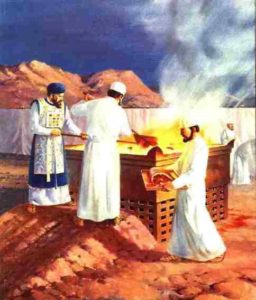
There is a remaining prophetic significance to Yom Kippur that has to do with the future of Israel which we will learn more of when we get to Chapter 23.
Leviticus 17 deals with the place of sacrifice and the sanctity of the blood.
The Place of Sacrifice
No ox, lamb, or goat could be slaughtered by anyone in Israel unless it was first brought to the entrance to the tent of meeting and presented to the priest as a peace offering. No one could sacrifice an animal in the field with a private ceremony, building their own altar of worship. Left to themselves, human beings will invent their own religion. God who created heaven and earth has made Himself known as a holy God and He has appointed one altar (This is a prophetic picture of the cross where Jesus was appointed to be the once and for all sacrifice).
The interjection of the command to not sacrifice to goat-demons is a reminder of the ever-present danger of reverting to the idol worship of our neighbors.
What are some of the idolatrous practices of our culture and how do we abstain from them?
The Sanctity of the Blood.
Leviticus 17:11 (NASB) 11 ‘For the life of the flesh is in the blood, and I have given it to you on the altar to make atonement for your souls; for it is the blood by reason of the life that makes atonement.’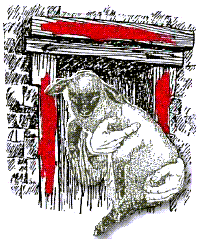
The eating or drinking of blood was forbidden. Why? The life of the flesh is in the blood (v.11, 14) In the case of an animal, its blood is identified with its life. In the sacrificial system, the animal is innocent, and its blood represents the sinless substitute.
Notice that the Lord says that the shed blood represents the life of the God-given substitute. “I have given it to you to make atonement for your souls.”
- Campbell Morgan writes, “Redemption is only possible by blood. The writer of the letter to the Hebrews gathered up the whole message of the Levitical economy in the words, “Apart from shedding of blood there is no remission.” (Heb 9:22). The shedding of blood is life given up. It is necessary to make this statement emphatically, because it is now sometimes asked whether it is not permissible to say that we are saved by life, rather than by blood, seeing that the old economy declared that “the blood is the life”? While that is perfectly true, it would still be utterly false to say that the teaching of Leviticus is that a man is saved by life. It teaches rather that he can only be saved by life given up, given up through suffering-not by blood, but by blood-shedding. The ancient symbolism was indeed awful and appalling, but the final weight of awe and horror ought to be that of the sin which made such symbolism necessary, in order to teach its real meaning to God. There are those who speak of the doctrine of salvation by the shedding of blood as being objectionable and vulgar. The shedding of blood is objectionable; it is awful, it is dastardly; but it is the ultimate expression of the activity of sin; and the whole meaning of the appalling truth is that sin, in the universe, touches the very life of God with wounding.
We know the book of Leviticus is terrible reading; it is a tragic story of blood and fire. It is time that this living message was heard anew, that sin smites God in the face, and wounds Him in the heart; and that redemption is the outcome of the tender compassion, which receives the wounding, and bends over the sinner, pardoning him by virtue of that infinite and unfathomable mystery of which the shedding of blood is the only equivalent symbolism.”
(G Campbell Morgan, Living Messages in the Bible)
It is through the shedding of the blood of Jesus that we have redemption.
1 Peter 1:18-19 (NASB) 18 knowing that you were not redeemed with perishable things like silver or gold from your futile way of life inherited from your forefathers, 19 but with precious blood, as of a lamb unblemished and spotless, the blood of Christ.
It is through the full atonement provided by the shed blood of Christ that we have forgiveness of sins.
Ephesians 1:7 (NASB) 7 In Him we have redemption through His blood, the forgiveness of our trespasses, according to the riches of His grace
It is through the blood of Christ that we can legally be pronounced righteous before a holy God (justification).
Romans 5:9 (NASB) 9 Much more then, having now been justified by His blood, we shall be saved from the wrath of God through Him.
Because we are justified through faith in Christ and His atoning blood, we now have peace with God (Romans 5:1). Without the shed blood of Christ that would be impossible.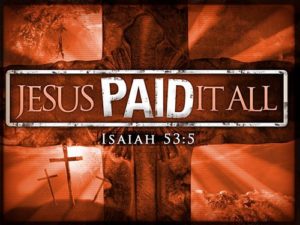
Colossians 1:19-20 (NASB) 19 For it was the Father’s good pleasure for all the fullness to dwell in Him, 20 and through Him to reconcile all things to Himself, having made peace through the blood of His cross; through Him, I say, whether things on earth or things in heaven.
Jesus is God. He knows what it takes to sanctify a sinner.
Hebrews 13:12 (NASB)
12 Therefore Jesus also, that He might sanctify the people through His own blood, suffered outside the gate.
It is important to distinguish the difference between ‘shed blood’ and ‘spilled blood’. The spilling implies an accident. The shed blood implies that the sacrifice is intentional. In this regard Jesus said ‘yes’ to the plan of redemption before the foundation of the world (Revelation 13:8).
As I have traveled to various countries around the world, I have heard believers singing in their own languages, “What can take away my sin? Nothing but the blood of Jesus.”
“You shall not do what is done in the land of Egypt where you lived, nor are you to do what is done in the land of Canaan where I am bringing you; you shall not walk in their statutes.” (Lev 18:3)
The Lord makes clear that the practice of sexual immorality was rampant and legalized in the written statutes of the surrounding nations. God’s covenant people “must not do as they do” (Leviticus 18:3)
What follows are the Lord’s judgments regarding sexual morality. God does not want His created order (Genesis 2:24) pertaining to human sexuality to be violated.
There is reference to “uncovering the nakedness” which in some cases may merely refer to voyeurism (Gen 9:22-23), it is most used as a euphemism for ‘sexual relations’.
Incest, fornication, adultery, male and female homosexual activity (18:22; Lev 20:13; Romans 1:27; 1 Cor 6:9) are at odds with the creation-ideal of heterosexual monogamy (Genesis 2:24-25).
G Campbell Morgan comments, “All the promiscuous intercourse between the sexes which inevitably tends to disease and degeneracy, was contrary to the mind of God, because it was destructive to humanity. Therefore, His people were safeguarded against those things by general command, and by detailed particularity of statement. In the interests of health and strength of national life these enactments are still of force. To break them is to bring about inevitable deterioration and ultimate destruction. The principle involved in the words has much wider application. The people of God are called upon to conform in all the ways and habits of life, not to the customs of the world, but to the mind and will of God as made known in His law. The full force of this principle is found in Paul’s injunction: “Be not fashioned according to this world; but be transformed by the renewing of your mind (Romans 12:2). It is a requirement of which we need to remind ourselves constantly. It is so easy to be lured from our loyalty by the customs of the men and the women by whom we are surrounded. Such requirement is not capricious. It is based upon God’s loving purpose for His own, and His determination to preserve them from all destructive practices.” (p. 39 G. Campbell Morgan, Searchlights from the Word)
The sexual immorality practiced in Egypt and Canaan defiled the land with destructive repercussions, described in such vivid terms as causing “the inhabitants being vomited out of the land.” (Leviticus 18:28)
NEW TESTAMENT READING- MARK 7:24-8:10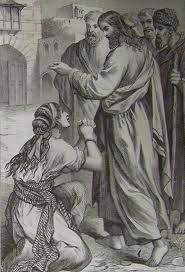
A Syrophoenician woman approaches Jesus with a petition that He heal her daughter who is vexed by demons. Mark refers to her as Syrophoenician which speaks of the political alliance which would be more recognizable by his Roman audience. She was a Greek born in Syrian Phoenicia. Matthew refers to her as a Canaanite woman (Matt 15:22).
Jesus’ response to her begging seems off-putting, “Let the children be satisfied first, for it is not good to take the children’s bread and throw it to the dogs” (7:27)
Although Jesus was using the commonly used derogatory term for a Gentile, he was doing this to convict the Jews of their prejudicial sin and unbelief. He was creatively teaching that the Gentiles, who were considered ‘dogs’ by the Jews, were more alert to God’s provision of a Savior than those who had the God-given privilege of sitting with the provision of salvation staring them in the face. Jesus came first to the Jews (John 1:11). They were the people through whom He came. They were His own. The Apostle Paul said that the gospel was to the Jew first, and then the Gentile. (Romans 1:16) The blessing of salvation was intended for all nations, but Jesus was indicating God ordained that salvation would be first offered to the people with whom He made a covenant.
The Jews called the Gentiles ‘dogs’ because they were ‘unclean’ according to the Levitical laws of separation. Jesus did not use the term derogatorily, but in a way in which the woman could understand his point, as is evidenced in her response. Jesus uses the diminutive word for ‘dogs’, meaning ‘puppies.
The woman’s response is one that demonstrates humility and faith. The woman knew why she was there. She was there for her daughter. She knew Jesus was her hope for her daughter’s deliverance from the grip of oppression. Her hope was not in her credentials. She did not presume that she was first in line to receive God’s favor. She was a Gentile.
Mark 7:28 (NASB) 28 But she answered and said to Him, “Yes, Lord, but even the dogs under the table feed on the children’s crumbs.”
She understands Jesus’ parable. She knows that she is not given a seat at the table but that there is enough on that table for every hungry soul in the entire world and she needs deliverance for her daughter now.
She demonstrates the humility of faith. She comes to Jesus submitting to His terms and not her own.
Mark 7:29 (NASB) 29 And He said to her, “Because of this answer go; the demon has gone out of your daughter.”
Jesus was impressed with her answer. She seems to have understood the purpose of His mission better than the people of Israel.
Tim Keller writes in his commentary on The Gospel of Mark, title “King’s Cross”:
This woman saw the gospel—that you’re more wicked than you ever believed, but at the same time more loved and accepted than you ever dared to hope. On the one hand, she is not too proud to accept what the gospel says about her unworthiness. She accepts Jesus’ challenge. She doesn’t get her back up and say, “How dare you use a racial epithet about me? I don’t have to stand for this!” Can you hear yourself saying that? But on the other hand, neither does this woman insult God by being too discouraged to take up his offer. See, there are two ways to fail to let Jesus be your Savior. One is by being too proud, having a superiority complex—not to accept his challenge. But the other is through an inferiority complex— being so self-absorbed that you say, “I’m just so awful that God couldn’t love me.” That is, not to accept his offer.
One of the great prayers of the English language is the prayer of approach to the Lord’s Supper, written by Thomas Cranmer, in the first Book of Common Prayer; it’s based on this story in Mark, and over the centuries millions of people have prayed it:
“We do not presume to come to this your table, merciful Lord, trusting in our own righteousness, but in your manifold and great mercies. We are not worthy so much as to gather up the crumbs under your table, but you are the same Lord whose property is always to have mercy.”
Every time anyone has ever prayed that prayer, Cranmer has been inviting them to step into this woman’s shoes and approach Jesus boldly, with rightness assertiveness. To take up both the offer and challenge of God’s infinite mercy.” (King’s Cross p. 89)
The good news is that Jesus tells her on the spot, “Because of this answer go; the demon has gone out of your daughter” (Mark 7:29).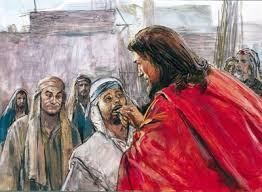
Jesus continues to demonstrate his authority by commanding deaf ears to be opened and mute tongues to be loosened. (Mark 7:31-37).
When Mark records the feeding of the 4000 with the miraculous multiplication of the seven loaves and a few fish, we learn that Jesus knew his audience. We are reminded that Jesus knew how long they had traveled, how far they had come, and what would happen to some of them if they did not get something to eat (Mark 8:3).
Don’t you think that He knows what you need ‘lest you faint’?
TODAY’S READING FROM THE BOOK OF PSALMS: PSALM 41:1-13
Notice the promises given to those who consider the helpless, and have regard for the weak: 1. The Lord delivers them (v.1). 2. The Lord will protect them and preserve their lives (v.2a) 3. The Lord will bless and defend them (v.2b). 4. The Lord will sustain them on their sickbed and restore them for their illness (v.3)
Psalm 41:1 1 How blessed is he who considers the helpless; The LORD will deliver him in a day of trouble.
Psalm 41 is a celebration of God’s mercy. God in His infinite grace can receive guilty sinners who know that their only hope is in the mercy that can receive us in the righteousness of Christ (v.12). He upholds us in the integrity of the perfect finished work of redemption.
David speaks of his hardships and the anguish of having close friends betray him. He experiences the betrayal of his son, Absalom, and his friend Ahithophel. And through this immediate sorrow we see a prophetic connection with Jesus being betrayed by his disciple, Judas.
TODAY’S PROVERB: In Romans 6:23 we learn that the wages of sin is death. In Proverbs 10:15, the wages of the righteous (Christ) is life. He offers both His righteousness and the reward of eternal life as a free gift.
Proverbs 10:15-16 15 The rich man’s wealth is his fortress; the ruin of the poor is their poverty. 16 The wages of the righteous is life, The income of the wicked, punishment.
As we pray for every nation of the world throughout the year, today we focus on Austria.
Challenge for Prayer
Austria, a nation of culture, music, art, and beautiful scenery lies for the most part spiritually empty. While 84% of Austrians believe in God (high for Europe), few have met Jesus personally. Rates of suicide, abortion, and alcoholism indicate the great need for spiritual foundations. Pray for the shell of religion in this nation to be filled by the living presence of Christ.
PRAYER: Our Gracious God and Father, thank You for the revelation of Your holiness, Your compassion, and Your justice. We are undeserving of Your favor, and yet through Your merciful provision of our Savior, You have made us partakers of Your incorruptible life, that He offered up for us. In remembrance of His outpoured life as He died for our sins, qualifying us to receive Your Holy Spirit, we take the cup of redemption with thanksgiving and drink of it. We do not presume to do this trusting in our own righteousness but in Your manifold and great mercies. We are not worthy so much as to gather up the crumbs under your table, but through faith in Christ Jesus our atoning Passover Lamb and Risen, Exalted, Glorified Lord and Savior, we meet you in mercy and rejoice at this table of fellowship! Thank You for the cleansing, enlightening and faith-igniting impact of Your Word. Help us to live through You and bring forth the fruit of Your Indwelling presence today, in Jesus’ Name. Amen
-David MacAdam
Pastor, New Life Community Church
Concord, Massachusetts


